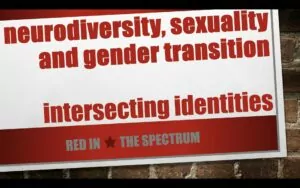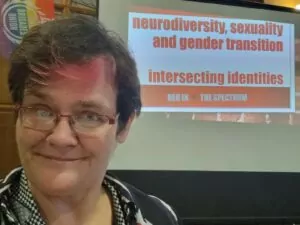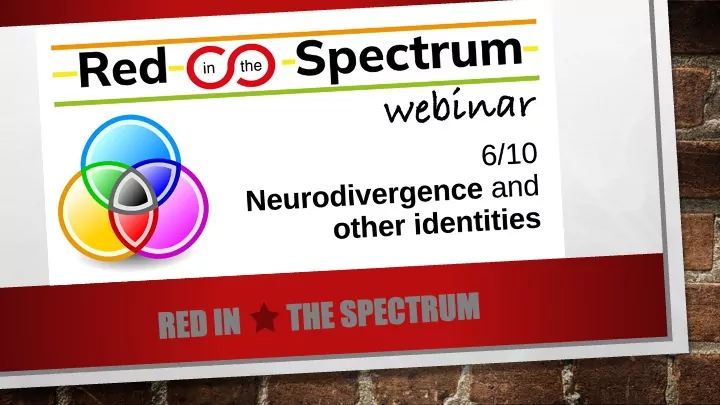Neurodivergent and LGBT+: intersecting identities
Neurodivergent and LGBT+: Intersecting identities
It is increasingly claimed that:
Neurodivergent (dyslexic, dyspraxic, ADHD, autistic etc) people are more likely to be LGBT+ (lesbian, gay, bisexual, transgender, or other non-cis/het) and vice versa.
However:
- Many of the claims are anecdotal.
- Nearly all statistical evidence relates to autism, and to a lesser extent, ADHD. Evidence is lacking of an association between, say, being dyslexic and bisexual, dyscalculic and lesbian, etc
- The statistical evidence relies on reporting — people telling the investigator about how they identify.
- Statistics can show only correlation, not cause.
So maybe, the claim is better worded as
People who know they are autistic or ADHD, and maybe some other neurodivergent people, are more likely to be openly LGBT+ and vice versa.
Neurodivergent and LGBT+: Some research findings

A 2020 study [Warrier, V., Greenberg, D.M., Weir, E. et al. Elevated rates of autism, other neurodevelopmental and psychiatric diagnoses, and autistic traits in transgender and gender-diverse individuals. Nat Commun 11, 3959 (2020)] found that:
- Autistic people might be three times more likely to identify as trans as non-autistic people.
- People who do not identify with the sex they were assigned at birth are three to six times as likely to be autistic as cis people.
- Autistic adults and adolescents are around eight times more likely to identify as asexual and ‘other’ sexuality than their non-autistic peers.
- Autistic males are 3.5 times more likely to identify as bisexual than non-autistic males.
- Autistic females are three times more likely to identify as homosexual than non-autistic females.
Of seventeen articles published between 2014 and early 2022 about the intersection of transgender/gender diversity and ADHD, twelve (71%) reported a prevalence, based on medical records. [Teddy G. Goetz & Noah Adams (2022) The transgender and gender diverse and attention deficit hyperactivity disorder nexus: A systematic review, Journal of Gay & Lesbian Mental Health]
Some thoughts from people who are both Neurodivergent and LGBT+
“Some of the ‘gender-critical’ people say that many trans people are just ‘autistic attention seekers’, which I don’t buy. I think it’s just that neurodivergent people like to know what they are doing, and if their gender expression is part of that, then so be it.” Georgie
“Queer folks are often under tremendous pressure from broader society to fit into norms. And when they don’t, it’s usually attributed to their sexuality or gender identity, so they’re not encouraged to consider that their experiences may be consistent with neurodiversity instead. … LGBTQ+ folks tend to have less access to health care, social support, and economic privilege, so they are often less able to get a diagnosis or ADHD medication or support or accommodations even if they do believe they have ADHD.” ADDitude reader
“Coming out as dyslexic took a few months. I had recently come out as gay, which gave me more confidence to come out as dyslexic. In the Muslim / Asian community, my parents’ generation want to think that we are all clever, and that if you fail your exams, you are a disappointment. There is not enough awareness of dyslexia, and like being gay, it is perceived as negative, as being unwell. But the younger generation are far, far ahead in their understanding, and are demanding support for neurodivergent people. They don’t keep it secret any more.” Mohammad
“Many of the stereotypes I have to contend with as a person with ADHD are identical to those I have to contend with as a bisexual woman‚ namely that I’m ‘flighty’ and ‘afraid of commitment.” ADDitude reader
“I’m a transgender man who has ADHD. Social gender norms exist, but often do far more harm than good. ADHD can sometimes make it seem like I don’t have a filter, but gender roles and expectations are unhelpful social constructs that filter trans people out and isolate us simply for who we are. I’m glad I lack that filter!” Daniel, Michigan
Neurodivergent and LGBT+: Why the apparent overlap?
Perhaps, if you find out and accept that you are LGBT+, that makes it easier to find out and accept that you are neurodivergent, and vice versa.
Perhaps it is easier to come out as neurodivergent if you have already come out as LGBT+ and vice versa.
Neurodivergent and LGBT+: Issues we share
Alongside the discussion about statistical overlaps, there are many issues which LGBT+ people and neurodivergent people both face in a society that discriminates against us.
We live in a society that exerts great pressure to be ‘normal’, and which considers LGBT+ people to be ‘queer’ and neurodivergent people ‘weird’. There are concerted attempts to prevent us, cure us or convert us. Behaviourist techniques are used to try to turn gay people straight and to make neurodivergent people act as though they are not.
Both groups are poorly served by the justice system, whether that be through criminalisation of harmless behaviours or through police ambivalence towards the violence and harassment we too often experience.
And both groups lack the support service we need in order to get by in society. Funding cuts have led to long waiting lists for assessments for neurodivergent conditions and for trans healthcare, and to cuts in already-inadequate services.
Neurodivergent and LGBT+: Keeping up the conversation

A couple of weeks ago, Red in the Spectrum’s Janine Booth ran a workshop at the Fire Brigades Union’s LGBT+ Conference, entitled Neurodiversity, Sexuality, Gender Transition: Intersecting Identities.
The discussions were thoughtful, honest and insightful, and this is sure to be a conversation that continues.
If your organisation would like to host a workshop on this subject, please contact Red in the Spectrum.


